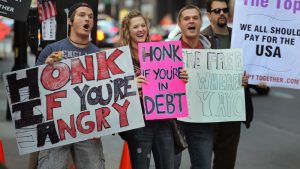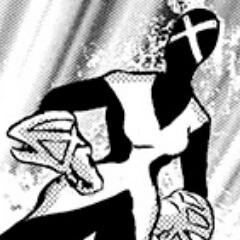
Last Saturday I went to hear Omali Yeshitela, founder of the Uhuru Movement, speak at Uhuru House in East Oakland.1 Though Yeshitela isn’t a native Oaklander, it’s clear from the moment he first opens his mouth that he is intimate with the issues plaguing urban black communities like Oakland’s, and he is brimming with wisdom on how to approach them.
In his talk, Yeshitela invoked the memory of his forebears and the activists of yesteryear, thanked the members of the Uhuru Movement who have kept it going for forty years, and gave a racially-centered Marxist critique of capitalism.
In his critique, he emphasized that capitalism is “based on a principle of parasitism,” or what Marxists call primitive accumulation (what we might now call start-up capital—the money or goods needed to start a business), which entails often forcibly claiming land, labor, and resources. For Western/white society, it entailed enslaving, killing, and banishing from their homes generations of black and brown people. The crimes committed against black and brown people have been so thorough and profound that we still suffer because of them today.
Yeshitela used his critique as a platform to passionately encourage his listeners to mobilize. It was somewhat shocking when suddenly, in the middle of this, he pulled out Lovelle Mixon’s name with a hint of admiration, saying, “Mixon knew it was better to die fighting than to live on his knees!”
Oh my.
One of Yeshitela’s pet causes is also one the people of Oakland are far too familiar with—unchecked police brutality against young black men. In 1996, Yeshitela was at the center of the campaign to protest the killing of Tyron Lewis, a black teen who died at the hands of St. Petersburg, Florida cops.
Yeshitela and the Uhuru Movement are so radical in their stance against police brutality that they were largely behind the effort to problematize the popular consensus on the deaths of Lovelle Mixon and four Oakland cops in 2009, framing it as an act of fighting back. The Uhuru Movement attempted to bring attention to the societal conditions that led Mixon to unleash his wrath on those four cops rather than be arrested.
Mixon was a destructive force—that fact is not debatable; he was suspected of rape and murder before he was even pulled over that day. But his armed resistance to the police, who won’t stop killing black people with impunity, and to the prospect of returning to prison obviously speaks to the many who rallied to make him a martyr (about 500 people attended his funeral), and who continue to honor his memory. Support for Lovelle Mixon has drawn a lot of criticism, but rather than criticize, I’m interested in the reason why so many in the black community identify with his fury.
I also want to use Yeshitela’s speech, and this brief but ardent mention of Lovelle Mixon, to highlight what I think is a distinct rift between the rhetoric of Occupy Oakland and the reality of daily life for many of Oakland’s most underserved and destitute.
Like Yeshitela/the Uhuru Movement, Occupy Oakland has taken on police brutality as one of its pet causes. No doubt, Oakland’s Occupants2 have been beaten down, harassed, and suppressed to the fullest extent practicable by (the 1%’s willful manipulation of) the law. They are the victims and survivors of the same corrupt cops and corrupt practices that have kept black folks in Oakland at war with the police for decades. But the similarities end right there.
On Saturday, Yeshitela had nothing good to say about the Occupy movement. To paraphrase, he argued that the Occupants are mostly white, outsiders, recently radicalized by their fall from the middle class, their lost jobs, their piling student loan debt, etc. He demanded to know: where were they before?
While I don’t fully agree with him—I know plenty of Occupants who are native to Oakland, many people of color, many who have endured profound suffering (not that you have to have suffered to care), and many who were active long before the Occupation—and while I actually still consider myself an Occupant in the global struggle, I couldn’t help but nod my head in agreement with his overall assessment of how the movement has represented itself in Oakland.
To put it plainly: Occupy Oakland has represented itself exactly how Yeshitela described it. Don’t get me wrong, there are many serious activists still involved in Occupy Oakland, the aforementioned people who have continued to work diligently, but there is also a very vocal minority that has been the face of the movement and is thus responsible for how it has appeared to the public.
I think this is behind why those whom we expect and hope to be the most active—people of color, working class people, people who have lost their homes and jobs or who may have never had secure homes and jobs—have never fully engaged with Occupy Oakland.
I believe it’s also why the former People of Color/Queer People of Color “Caucus” (Q/POC), which now goes by the name Decolonize Oakland, divested itself from Occupy Oakland, and why so many more people of color and working class folks who were once involved now find themselves on the sidelines, warily watching to see where this whole thing is headed.
Few of the issues important to this community can capture the nature of the rift between Occupy Oakland and the community better than the differing perspectives of and responses to police brutality. It is a rift which, true to the term I’ve chosen to use, is like a fault-line: indiscernible if you don’t know how to look for it, or even what you’re looking for, but indicative of something capable of great destruction.
I grew up in Indianapolis where police brutality is not nearly as epidemic as in larger cities. I consider it a stroke of luck (an understatement, to be sure) that my brothers, while having been unnecessarily targeted, stopped, searched, and unlawfully arrested and held by police, have never been beaten, shot at, or killed by them.3 But when my older brother visited me in Oakland last month, I felt it necessary to give him explicit instructions on how to dress and carry himself, lest he be mistaken for someone else by his peers or, a scenario I considered equally as likely, by cops.
While we transplants smugly swap stories about how we feared moving to Oakland before we got here and realized it was such a great town, and exclaim to our parents “No, no, it’s not dangerous at all,” Oakland remains more perilous for a young man of color than for any other demographic.
Herein lies the difference between Occupy Oakland’s struggle against police brutality and the social circumstances that cause some—mostly urban people of color—to hold fast to the belief that cops are mortal enemies. If you are a person of color, especially a young male, at any given moment, no matter where you are, no matter what you’re doing, to catch the eye of a cop may be to look death straight in the face.
This is not based on an ideology; this is a matter of life and death.
“To die fighting was better than to live on his knees.”
To me, the fact that so many black people in Oakland and beyond identify with Lovelle Mixon (or, like me, are ambivalent, willing to acknowledge that his story is far more complex than the official line would have us believe) reflects an innate knowledge about taking action of any kind, and it’s precisely why we identify with him.
To finally take action in defense of ourselves, our families, our communities, our livelihoods, our dignity, our sanity, is not just a matter of justice. It’s a matter of life and death.
To finally break away from poverty, oppression, self-hatred, the racism we have internalized and turned against ourselves, is to metaphorically catch the eye of a cop.
We are subtly taught from birth by our conditions what our parents and grandparents were told out loud: don’t look a white man in the eye. Always call him, “sir.” Never fight back. If you do fight back, you’ll be crushed, and you and your family will be made an example for others.
Of course, I say this figuratively; these lessons, the damage done and its effects, are now psychological, unspoken, but they inform our definition and approach to radical activism.
In other words, this is not a game. As Yeshitela argues, all of Western empire was built on the labor and genocide of black and brown people, and it depends on the continued oppression of these people to keep running. It depends on our cheap labor, our short lives, our poor education, our high incarceration rates, and our dependence on the state and corporations for assistance and affordable goods.
It’s not with a lack of care or thought that any of us embarks upon the mission of social justice. It is, in fact, with heavily burdened hearts, and with a great deal of fear and courage, that people of color volunteer to bear the cross of social justice.
By that I don’t mean to say that social justice isn’t everyone’s cross to bear. Of course it is. Society-at-large’s, especially the 1%’s, failure to recognize this is why so many of us suffer. But so many of the problems we hope to attack by pursuing social justice are problems rooted in systemic racism.
Like police brutality.
It’s easy for masses of people to protest the killing of Alan Blueford, because he was a beautiful young man, practically a baby, executed, no, exterminated like a rat—a death which he could not possibly have deserved.
For most of us, figuring out whether or not killing Alan Blueford was right or wrong doesn’t require plumbing any depths. It doesn’t require challenging our conception of what happened, what’s right and what’s wrong, what’s really at stake when we take to the streets in protest.
Yet, the ease with which we understand it to be wrong causes us to gloss over that aforementioned rift. One black blogger describes this scenario better than I ever could, when she writes of a May 12th March from the site of Blueford’s death to the Eastmont Police Station.
At the station, people crowded up against the glass front of the building as chanting continued. One of the march organizers got on a mic asking people to back away from the glass with the message “We’re not here for ourselves!” to which an apparent ally responded, “We’re here because we hate cops!”
I am not questioning whether the racist, classist, transphobic, and homophobic institution of policing is deserving of hate, but the dissonance produced by these two statements heard one after another gives me pause. Repeated sternly over the mic several times, “We’re not here for ourselves,” contrasted with the (perhaps waning) protest cry heard over the last several years that “We Are All (insert cause or name here).” “We’re not here for ourselves” signified a shift from displacing the slain with our own selfish imaginations, a departure from the self-centered act of putting ourselves in the other’s shoes, or the other’s shoes on ourselves. It meant, for a moment, that we could be gathered together because we value black life and black love, regardless of our relation to it or with it.
But, without missing a beat, an apparent ally fired back, dismantling the possibility of gathering for the value of blackness. I tell you that the reply to “We’re not here for ourselves” felt more like hearing “Yes, we are.”
The people of Oakland don’t hate the cops out of nowhere, just to hate the cops. They hate the cops because the cops are killing their children. It would, therefore, perhaps be befitting for Oakland’s Occupants to re-evaluate their entrance into the decades-long war with police in Oakland that briefly culminated in Lovelle Mixon’s militant outburst in 2009, and which, unfortunately, continues.
Is it motivated by a deep love for black life and a desire to commiserate with the families of the fallen, or is it motivated by something else?
I would argue that it’s motivated by something else.4
What I have observed amongst Oakland’s Occupants is a failure to acknowledge that racial struggle is of primary importance; an unwillingness to get to the nitty-gritty of racial politics mystifyingly coupled with a troubling amount of ignorant commentary on race; a hint of tokenism in the way many white Occupants seem to regard their “comrades” of color; a lack of respect for what people of color endure not only in our daily lives, but also what we endure, what we put on the line, in order to fight the good fight; a failure to recognize or outright attempts to co-opt actions related to struggles that directly affect us; a lack of respect for or complete dismissal of our complaints, our wishes, and our concerns, as well as our elders, our faith communities, and our neighborhoods . . . need I go on; and miles and miles of self-congratulations with nary an ounce of serious reflection.
Instead, I’ve seen Occupants run the gamut of insults, sometimes veiling attitudes that I would call racist, sometimes completely misunderstanding or misrepresenting the interior lives of people of color. I’ve seen Occupants say that anyone who brings up race is racist. I’ve seen them accuse cautious people of color of “liberal demagoguery” (excuse my language, but what the fuck?).
In one notorious incident, I saw Occupants ridicule the decision of the organizers of the May Day March for Dignidad y Resistencia to have the march permitted, then repeatedly rationalize the fact that they ridiculed them. No reverence for the incredible consequences that undocumented marchers could face if arrested, no reverence for the organizers’ ability to scrutinize—using their own intellect, experience, and intuition—all possible options and outcomes and to have decided for themselves what was the right way to handle their own action.
I find this deeply disconcerting. I am by no means saying that by virtue of being a person of color I have all the answers, or that people of color in general have all the answers, or that we all agree on what the answers are. White allies are needed, indispensable, and their opinions are absolutely of value. As Chris from the Occupy Oakland Tactical Action Committee recently said, “Not one of us has all the answers. We’re all pieces in a giant puzzle.”
Nevertheless, it concerns me that in lieu of reaching out and really listening to the very people whose lives are most intensely affected by the ravages of capitalism in Oakland, Occupy Oakland has settled for what appears to me to be a paternalistic attitude at best.
This concerns me not only because it “hurts my (our) feelings,” but it also ignores the clear necessity for people of color to be front and center in the fight for our own liberation from the capitalist structure. For lack of a better word: duh.
In a city where approximately three-quarters of the people are non-white or white Latino, where black and brown people are the people most in need of a revolution (whatever our definition of it), you’d think any effective popular movement would be more representative of them. That it would make more of an effort to engage, dialogue with, mobilize, and join hands with them, or be almost entirely made up of them.
Why is this not so?!
Instead, many of my friends who are of color lament the missed opportunity: here it was, Occupy, a gift in a word that became a household name and a global phenomenon, something we could all attach ourselves to, mold, utilize—snatched by people whose patience was too short to build a truly democratic strategy and structure for revolution, whose motives were God-knows-where, whose ears were closed to the voices of the Oakland community, whose mouths were too big for those community voices to even be heard.
It doesn’t even make sense to me that there could be any talk of building a better Oakland without the consent and enthusiastic participation of Oakland-at-large. Fuck it, I’ll just say it: where the hell are the people from deep East and deep West Oakland? Where are the leaders of Oakland’s communities of color?5
I’ve been called an eternal optimist, but, for once, I don’t have any encouragement to give or any proposed solution, except maybe this: if the people of Oakland, the people of color, the working class people, have anything to say about Occupy Oakland, if they haven’t forgotten about it and moved on, haven’t already given up on it or dismissed it as dead or useless, perhaps it could be, “it’s mine too, dammit, and I’m here to claim my place in it.”
1.I use Yeshitela/the Uhuru Movement as a springboard and am aware, though not well-versed in, his/their at-times problematic presence in Oakland. I believe that to be beside the point.(Back)
2.I don’t like the term “Occupant” and no longer necessarily agree with the usage of “Occupy” to describe a movement that is about liberation, but for the sake of simplicity…(Back)
3.Praise Jesus.(Back)
4.And you don’t even want me to speculate on what that something else is. I’m going to continue to publicly assume pure intentions.(Back)
5.Please don’t be ignorant enough to argue that they didn’t come to Occupy Oakland. They did. Not that they should have needed to. But, here’s an example of an opportunity that was actually documented: back in January, when Reverend Harold Mayberry encouraged the members of the First African Methodist Episcopal Church to join Occupy, Occupy Oakland should have clapped its hands, sung hallelujah, and put out the welcome mat. Yet, nothing materialized from what could have been an incredibly fortuitous and mutually beneficial relationship. It’s a shame, and it’s not the only time something like that happened.(Back)








